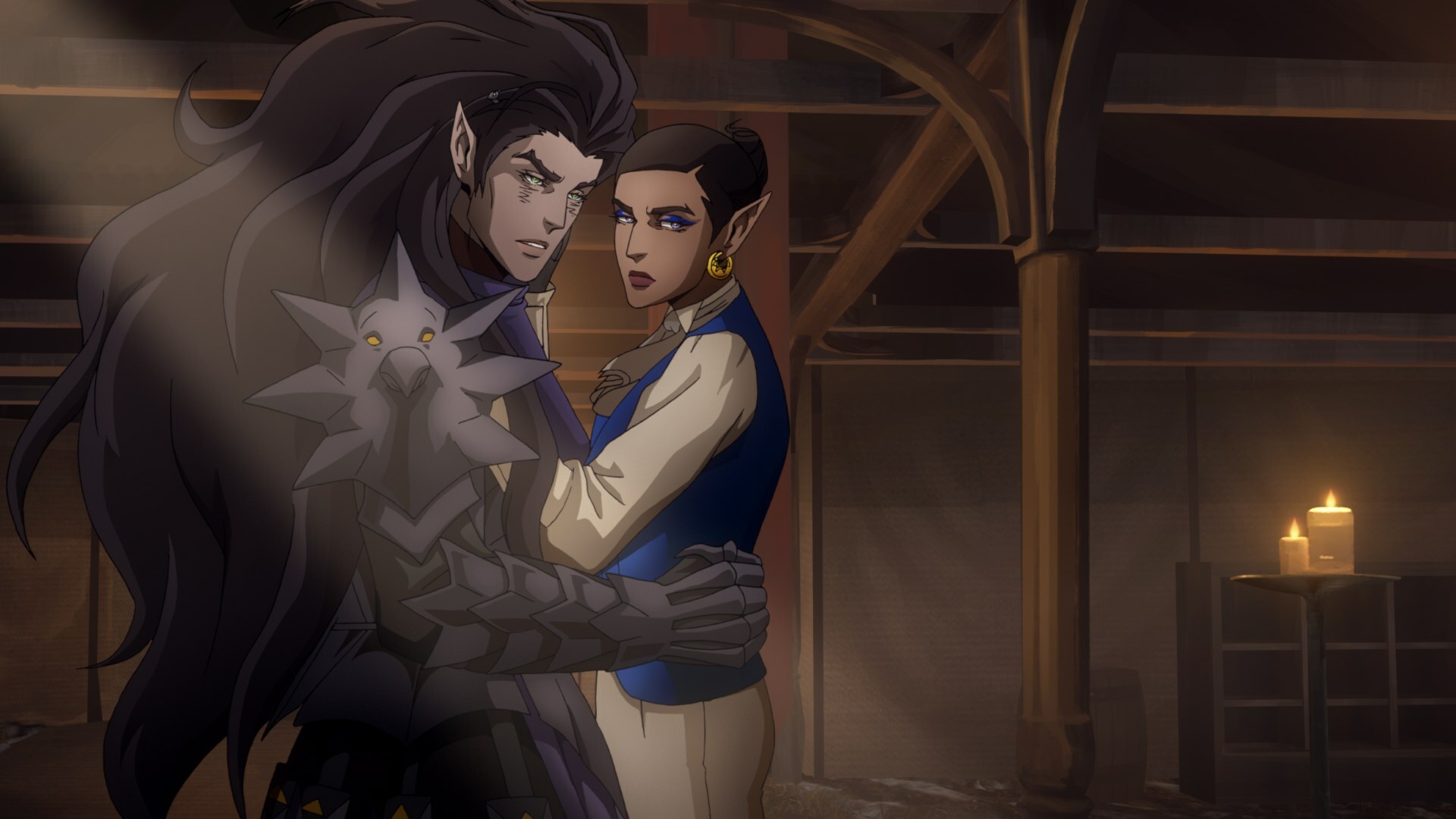Best Female Characters in ‘Castlevania’
Bare your teeth for these ladies (who are mostly vampires)!

When an anime has at least one canonically queer character, there’s plenty of celebration. But to have several openly queer people, especially sapphic vampires, is a dream come true. Castlevania’s representation overall is relatively vast, and while it’s not perfect, there’s much to discuss where its female characters are concerned. While the plot does follow Trevor Belmont (Richard Artimage) and his allies who are aiming to defeat Dracula (Graham McTavish)’s forces, the women aren’t sidelined.
Rather than the women being depicted as weak and constantly needing men to save them, they are pretty independent. That’s sometimes lacking in period pieces and essentially creators are telling on themselves when they feed into stereotypes. Allowing women to be antagonists (who don’t become heroes in the end) isn’t a terrible thing. It’s not inherently misogynistic to have women be unapologetically villainous. Obviously, there are cases where the villain isn’t to be rooted for and are horrible people. Whether these ladies I’m about to list are horrible or not is up to you as the reader. They are simply some of the best in the series.
Sypha Belnades
Take no shit female characters are almost always a delight. Sypha (Alejandra Reynoso) not immediately swooning over Trevor is so refreshing. In fact, she has visible disdain for him in the beginning. Even though he saved her from what was an excruciating predicament. And her relationship with Trevor isn’t what makes her character interesting. She’s a very powerful Speaker and lives as an outcast, essentially, because hey, the time period. Her personality overall is that of an upbeat champion. All of that willingness to survive is very evident as the series carries on. And without her, who knows how Trevor and the rest of their allies would have fared. In the end, she does find good in Trevor, helps save the world, and is pregnant by the time the series ends. It’s quite remarkable the journey her character takes.
Lisa Tepes
Of course, it’s not a woman’s job to change anybody, let alone a man. And yes, Lisa (Emily Swallow)’s death serves as the catalyst for Dracula losing his shit and hating humanity again. But she’s actually an important character throughout the series. Her influence on their son, Alucard (James Callis), is what helps him strive to be better than his father. And her intelligence in the studies of medical science are remarkable. Not only that, but she didn’t write Dracula off for being a vampire, whereas anybody else would. Which led to her becoming a successful doctor, being happily married to Dracula and giving birth to their son. Naturally, the church accused her of being a witch because of a bitter “wise woman” and sentenced her to death. She does get resurrected and carries on with Dracula. Which is a fitting end for her character.
Carmilla
Being a manipulative, seductive, and bisexual vampire is no easy feat for Carmilla (Jamie Murray). She has to assert dominance much more than the men around her. Which isn’t so unusual, but her character comes across as despicable when it’s not so cut and dry. Of course, her motivation to essentially rule over humanity is quite nuts. Though her status as a vampiress queen and leader of the Council of Sisters adds layers to her character. Rather than be a regular vampire pretending to have power, she just simply has it. And maintains that power until she meets her demise later on in the series. It’s safe to say though that her presence, every time she pops on screen, is so fixating. And she deserves to be recognized as one of the best ladies.
Striga + Morana
It may seem weird to list them both at the same time, but they really are best when they are together. Striga (Ivana Miličević) is more androgynous in her presentation and demeanor. Her accent is quite thick and somewhat deep. Which is a nice change of pace from the more feminine presenting women in the show. Meanwhile, her lover, Morana (Yasmine Al Massri) is quite femme, visibly a woman of color, and has an elegant way about her. Their relationship is actually heartwarming and they clearly love each other. It makes you want to know more about them beyond their roles as queens of Styria or Council of the Sisters. Regardless, they still serve as intriguing characters, earning them spots on this list.
Lenore
Sometimes it’s the most innocent-looking characters who are incredibly manipulative and strategic. Lenore (Jessica Brown Findlay) is one of those characters who is more dangerous that way. She makes Hector (Theo James) believe he can trust her, seduces him, and then makes him her slave (the word choice is very uncomfortable). There’s a lot of up and down for her character because she seems genuine until she isn’t. Again, unapologetically villainous women should be depicted just as much as heroic women. People can still see themselves in villains, maybe even more than heroes (believe me). Lenore is just one of those characters who doesn’t make a lot of apologies for her behavior. She falls pretty far from her position of power and it leads nowhere good for her. But that doesn’t mean she wasn’t a solid enough character.
(featured image: Netflix)
Have a tip we should know? tips@themarysue.com